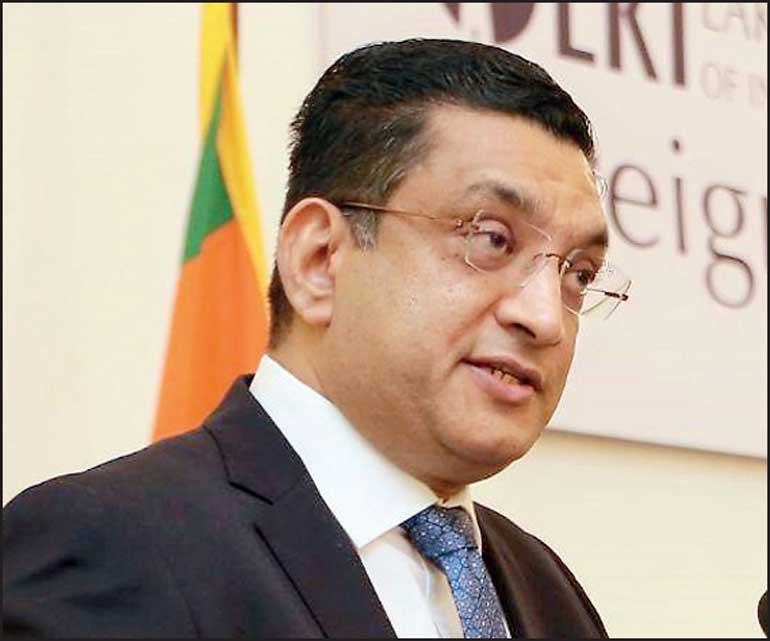Monday Feb 23, 2026
Monday Feb 23, 2026
Friday, 1 March 2024 00:00 - - {{hitsCtrl.values.hits}}

Foreign Affairs Minister Ali Sabry
Foreign Minister M.U.M. Ali Sabry last week declared that non-alignment means a country is not forced or coerced into a camp to take sovereign decisions.
The Minister emphasised this aspect when he delivered the opening address at the third ‘LKI Foreign Policy Forum’, held on the theme ’Reassessing Non-Alignment in a Polarised World’ the quarterly flagship event of the Lakshman Kadirgamar Institute of International Relations and Strategic Studies (LKI) at the LKI Lighthouse Auditorium.
“In the emerging multipolar world, countries like Sri Lanka, if we learn from our history, cannot take sides. Sri Lanka must be open to working with anyone. Non-alignment means not becoming a bystander. Non-alignment means you are not forced or coerced into a camp to take sovereign decisions. But you take decisions. And you make your own choices. Whether it is commercial, security, regional or otherwise. It is in this sense that Sri Lanka needs to have guidance and support to charter that course. What is right for our country, what are the opportunities for us? What are the challenges in that while preserving our sovereignty to proceed with it? Across party lines, Sri Lanka is yearning to continue its greatest legacy of an independent and sovereign foreign policy. That is there to stay. But the modalities as to how we progress with that in a pragmatic manner in an ever-increasing polarised world is what we need to learn,” said Minister Sabry.
The event was attended by a representative gathering comprising heads of diplomatic missions and international organisations, Government officials, academics, business leaders, civil society, media practitioners, as well as students.
Referring to the NAM Summit in Kampala, Uganda, in January 2024, the Foreign Minister highlighted the significance of the summit as an opportunity for NAM to assess global developments and review its functioning as the pre-eminent multilateral body of developing countries, and the challenges it faces.
Responding to the Summit theme ‘Deepening cooperation for shared global affluence’, he noted that President Ranil Wickremesinghe in his address had noted that NAM’s membership was no longer a grouping of weak states, and that as a result of the rapid progress and economic advancement of some of the Asian, African and Latin American states, a majority of the 10 leading economies of 2050 will belong to this movement. Observing that within NAM were rising aspirants for leadership status in global affairs, the President had emphasised that they must be prepared to give leadership, and that NAM must play a vital role as geo-strategic rivalries in political, economic, technological and military terms becomes more pronounced among former and new contenders for major power status.
The Minister noted that the recent summit also served as a platform to discuss the challenges faced by NAM member states and particularly drew considerable attention to the humanitarian crisis in Gaza. Referring to the dire humanitarian situation in Palestine, Minister Sabry emphasised the importance of the NAM speaking in one voice when the very principles on which the movement is based are challenged. He expressed satisfaction with the outcome of the summit, noting overwhelming support for all amendments proposed by Palestine to the outcome document. He reaffirmed Sri Lanka’s solidarity with the Palestinian people and its commitment to supporting them in their quest to achieve their inalienable rights.